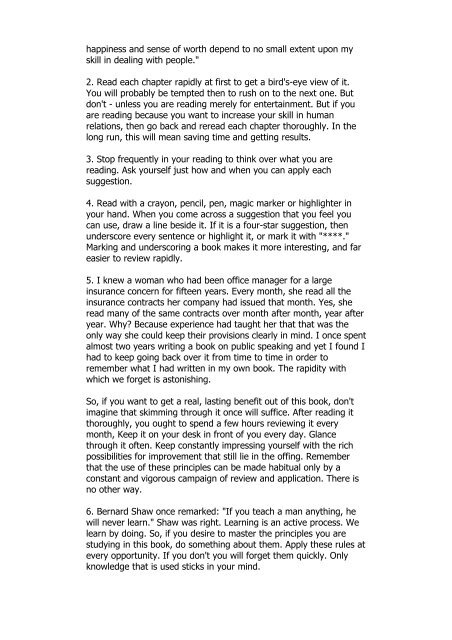How to Win Friends and Influence People - Mohit K. Arora
How to Win Friends and Influence People - Mohit K. Arora
How to Win Friends and Influence People - Mohit K. Arora
Create successful ePaper yourself
Turn your PDF publications into a flip-book with our unique Google optimized e-Paper software.
happiness <strong>and</strong> sense of worth depend <strong>to</strong> no small extent upon my<br />
skill in dealing with people."<br />
2. Read each chapter rapidly at first <strong>to</strong> get a bird's-eye view of it.<br />
You will probably be tempted then <strong>to</strong> rush on <strong>to</strong> the next one. But<br />
don't - unless you are reading merely for entertainment. But if you<br />
are reading because you want <strong>to</strong> increase your skill in human<br />
relations, then go back <strong>and</strong> reread each chapter thoroughly. In the<br />
long run, this will mean saving time <strong>and</strong> getting results.<br />
3. S<strong>to</strong>p frequently in your reading <strong>to</strong> think over what you are<br />
reading. Ask yourself just how <strong>and</strong> when you can apply each<br />
suggestion.<br />
4. Read with a crayon, pencil, pen, magic marker or highlighter in<br />
your h<strong>and</strong>. When you come across a suggestion that you feel you<br />
can use, draw a line beside it. If it is a four-star suggestion, then<br />
underscore every sentence or highlight it, or mark it with "****."<br />
Marking <strong>and</strong> underscoring a book makes it more interesting, <strong>and</strong> far<br />
easier <strong>to</strong> review rapidly.<br />
5. I knew a woman who had been office manager for a large<br />
insurance concern for fifteen years. Every month, she read all the<br />
insurance contracts her company had issued that month. Yes, she<br />
read many of the same contracts over month after month, year after<br />
year. Why? Because experience had taught her that that was the<br />
only way she could keep their provisions clearly in mind. I once spent<br />
almost two years writing a book on public speaking <strong>and</strong> yet I found I<br />
had <strong>to</strong> keep going back over it from time <strong>to</strong> time in order <strong>to</strong><br />
remember what I had written in my own book. The rapidity with<br />
which we forget is as<strong>to</strong>nishing.<br />
So, if you want <strong>to</strong> get a real, lasting benefit out of this book, don't<br />
imagine that skimming through it once will suffice. After reading it<br />
thoroughly, you ought <strong>to</strong> spend a few hours reviewing it every<br />
month, Keep it on your desk in front of you every day. Glance<br />
through it often. Keep constantly impressing yourself with the rich<br />
possibilities for improvement that still lie in the offing. Remember<br />
that the use of these principles can be made habitual only by a<br />
constant <strong>and</strong> vigorous campaign of review <strong>and</strong> application. There is<br />
no other way.<br />
6. Bernard Shaw once remarked: "If you teach a man anything, he<br />
will never learn." Shaw was right. Learning is an active process. We<br />
learn by doing. So, if you desire <strong>to</strong> master the principles you are<br />
studying in this book, do something about them. Apply these rules at<br />
every opportunity. If you don't you will forget them quickly. Only<br />
knowledge that is used sticks in your mind.


